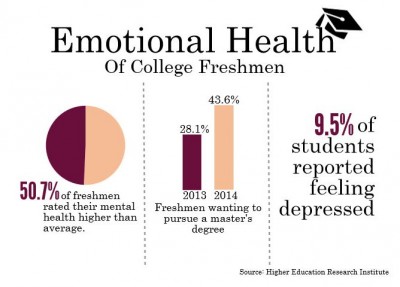
Emotional health for freshman college students has declined in connection with higher academic expectations, a Wednesday study by the Cooperative Institutional Research Program at the Higher Education Research Institute at the University of California, Los Angeles found.
The study, titled “The American Freshman: National Norms Fall 2014” surveyed 153,015 first-time full-time American students who began school at 227 four-year institutions in the fall of 2014.
The percentage of freshmen rating themselves as above average for emotional health was 50.7 percent, its lowest level ever and 2.3 percent lower than 2013, the study stated.
Jori Berger-Greenstein, the director of curriculum in the mental health counseling and behavior medicine program at Boston University School of Medicine, said this decrease reflects realities of the job market.
“That’s probably due to a couple of things, one being that more education is associated with a better salary and being more competitive for positions. I feel that not getting an undergraduate degree makes it difficult for folks, and we’re even moving toward not having a graduate degree, whether it’s an MBA or a doctorate or advanced certification that makes it harder to be competitive in this country,” she said.
Freshman undergraduate students who want to pursue a master’s degree increased from 28.1 percent to 43.6 percent. Students whose objective is a professional degree increased from 21.1 percent to 32.9 percent, the study stated.
The study also concluded that the percentage of students who felt depressed increased to 9.5 percent, which Berger-Greenstein said could be attributed to students becoming more familiar with acknowledging their feelings.
“It also might be that people are better at acknowledging that they struggle with mental health problems or some sort of unhappiness or however you want to term it,” she said. “There’s growing awareness that these things are pretty common, and so it’s not as stigmatizing for people to acknowledge that’s what they experience.”
Alcohol and tobacco use have dropped to all time lows, the report stated. Those who reported drinking frequently declined from 72.4 percent in 1981 to 33.5 percent in 2014. Similarly, 1.7 percent of 2014 respondents said they smoked cigarettes, compared to 9.2 percent of students in 1981.
As the percentage of students who reported socializing or partying have declined, use of social media and online interaction has increased, the report stated. The percentage of students spending six or more hours on social media increased from 18.8 percent in 2007 to 27.2 percent in 2014.
An increase in online and social media use for students may actually increase loneliness rather than combat it, Berger-Greenstein said.
“The world is complicated, and I think the pressures of growing up and the pressures of being independent are greater than they used to be,” she said “There’s data actually to show that loneliness is increasing, even though people in some ways feel more connected online because they’re not as focused on in-person activities and interactions, and that creates loneliness.”
While colleges are doing what they can to educate students about mental health issues, Berger-Greenstein said, there are limitations. She said she hopes the study will bring more awareness and funding to help universities assist students facing emotional and mental health issues.
“One outcome that I think would be terrific is that they could create more funding for universities to be able to actually offer assistance because I think that’s really a struggle,” she said. “I also think that growing awareness is important.”
Several students said they value their emotional health and recognize how certain factors can decrease that health.
Krystal Ramsamooj, a sophomore in the College of Arts and Sciences, said the current economic landscape can pose a threat to students’ emotional health.
“It [reasons for the drop] could be possibly economic factors that make affording college difficult along with a decrease in the worth of undergraduate school because of the difficulty of finding a job post graduation even with a degree,” she said.
Christina Mazzio, a freshman in the College of Communication, said high academic expectations can result in a lot of stress.
“Since more students wish to pursue graduate school, there is more pressure to succeed at the undergraduate level, making students more stressed and less healthy mentally,” she said.
Jessica Kupczak, a freshman in CAS, said the uncertainty of the future could cause emotional discomfort for students.
“A reason [people are stressed] is that everyone is worried about their futures,” she said. “Everyone is confused about finding themselves, finding their friends, finding out what they want to do with their lives.”























































































































